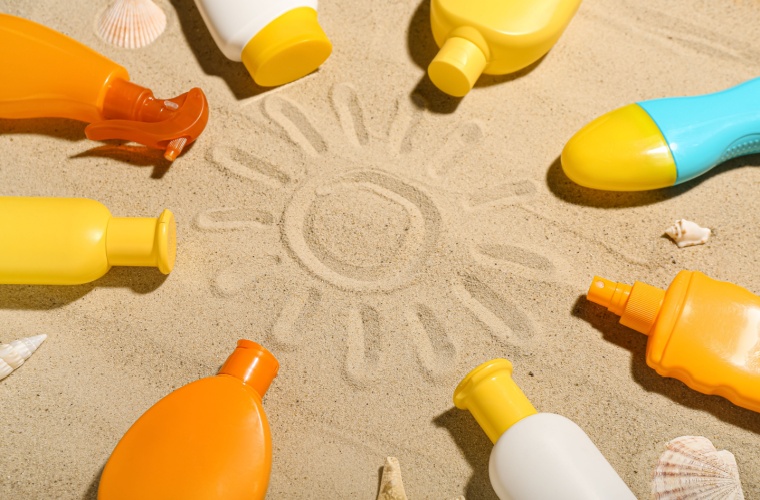Sun Savvy: Tailoring Your Sunscreen to Fit Your Skin and Lifestyle

When it comes to keeping your skin healthy and youthful, sunscreen is your best friend. It's a must-have in your daily skincare routine, acting as the first line of defense against harmful UVA and UVB rays that can cause skin damage, premature aging and skin cancer. Choosing the right sunscreen can be overwhelming with so many options available. However, understanding your skin type and lifestyle can simplify the process.
1. Understand SPF and PA+++ Ratings:
- SPF, or Sun Protection Factor, measures protection against UVB rays. The American Academy of Dermatology (AAD) recommends using a broad-spectrum sunscreen with an SPF of 30 for everyday use. If you’ll be outside for long periods, go for SPF 50 or higher.
- PA+++ is a rating system that indicates the level of protection a sunscreen provides against UVA rays, which are responsible for skin aging and long-term skin damage. The more "+" signs, the higher the protection:
- PA+ provides some UVA protection.
- PA++ offers moderate protection.
- PA+++ gives high protection.
- PA++++ indicates very high protection.
For most people, a PA+++ rating is sufficient for daily use and provides ample protection against UVA rays. However, if you have fair skin, a history of skin cancer, or spend extended periods in intense sunlight, opting for a PA++++ sunscreen may be beneficial.
2. Match Your Skin Type:
- Oily Skin: Opt for a lightweight, oil-free, or gel-based sunscreen. These formulas help control excess oil and keep your skin feeling fresh.
- Dry Skin: Choose a sunscreen with hydrating ingredients like hyaluronic acid or glycerin. Cream-based sunscreens are ideal as they provide extra moisture.
- Sensitive Skin: Look for sunscreens labeled as "hypoallergenic" or "for sensitive skin." Mineral sunscreens containing zinc oxide or titanium dioxide are often less irritating.
- Combination Skin: Go for a sunscreen that balances hydration without being too heavy. A broad-spectrum formula with a lightweight texture can work well.
3. Types of Sunscreen:
- Chemical Sunscreens: Absorb UV rays. They tend to be less visible on the skin but should be applied 15 minutes before sun exposure.
- Physical (Mineral) Sunscreens: Contain zinc oxide or titanium dioxide to block UV rays. They work immediately upon application and are often recommended for sensitive skin.
4. Consider Your Lifestyle:
- Active Lifestyle: If you’re frequently outdoors or engage in sports, select a water-resistant sunscreen. These are designed to stay on your skin longer, even when sweating or swimming.
- Daily Use: For everyday protection, a broad-spectrum sunscreen with SPF 30 to 50 is generally sufficient. Look for a non-greasy, lightweight formula that can be easily applied under makeup.
- High UV Exposure: If you spend a lot of time in the sun, consider a sunscreen with higher SPF (50+) and reapply every two hours. Broad-spectrum protection is crucial to shield against both UVA and UVB rays.
“If you wear makeup containing SPF, it is still crucial to wear a broad-spectrum sunscreen under your makeup,” Dr. Dahlia Saleh, a board-certified dermatologist serving the St. Petersburg, Florida area for BayCare Medical Group, notes. “Some makeup products contain SPF, but it’s best to use a dedicated sunscreen for full protection.”
Proper application is key to effective sun protection, Dr. Saleh reminds. Apply generously to all exposed skin, and reapply every two hours, or immediately after swimming or sweating. Sunscreens should be used on all skin types and tones, as everyone is at risk for sunburn and skin cancer.
What to Do If You Get a Sunburn:
Despite your best efforts to protect your skin, sunburns can happen. Here’s how to care for sunburned skin:
- Cool Down: Take cool baths or showers to help soothe the skin.
- Moisturize: Apply a moisturizer with aloe vera or 1% hydrocortisone to help calm the skin.
- Stay Hydrated: Drink extra water to prevent dehydration.
- Avoid Further Sun Exposure: Stay out of the sun until the burn heals.
- Take Pain Relief: Over-the-counter pain relievers like ibuprofen can help reduce pain and inflammation.
- Wear Loose Clothing: Soft fabrics won't irritate your sunburned skin. Breathable fabrics like cotton are ideal.
- Seek Medical Attention (if needed): If you experience severe blistering, chills, fever, headache, confusion or signs of infection, such as swelling or puss, seek medical help promptly.
A sunburn will most often heal on its own in 1 to 2 weeks. Additional information on sunburn treatment can be found here.
Finding the right sunscreen tailored to your skin type and lifestyle ensures you stay protected and comfortable in the sun. Enjoy your time outdoors while keeping your skin healthy and safe!
To hear more from Dr. Saleh and learn about skin cancer and prevention tips, tune in BayCare HealthChat, the official podcast series of BayCare.
